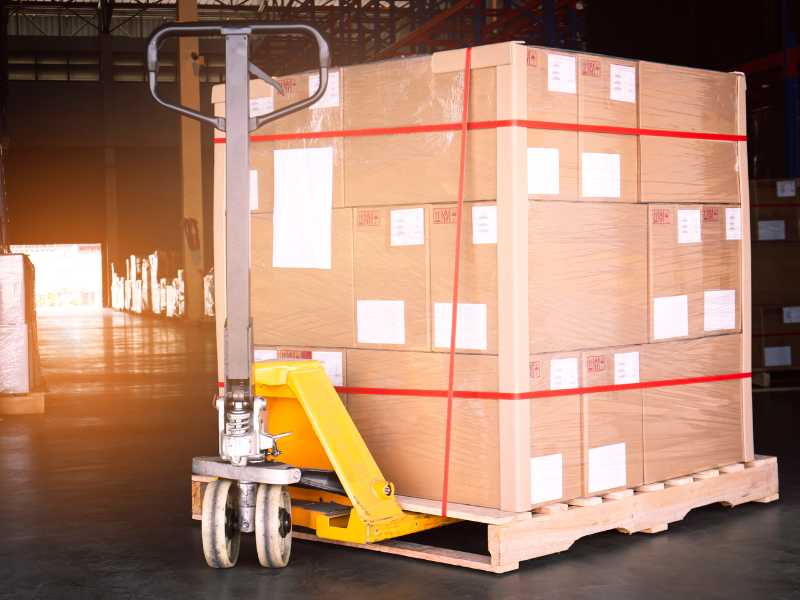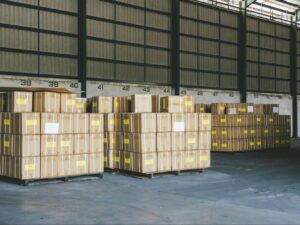Our question for this writing has us asking… how a B2B fulfillment company can help you. To determine an answer, we will first need to be able to differentiate between the different types of fulfillment. After we go over the types we will focus on B2B and look into fulfillment solutions, and what services B2B fulfillment involves for understanding how it can help.
First, there are types of commerce. We see a great deal of eCommerce taking place, wherein single customers order products online. There is also commerce wherein a brick-and-mortar store orders stock from another business and sells these products in their store, and possibly online as well. This second option is a business-to-business interaction, called B2B.
The fulfillment company that services these orders is a B2B fulfillment company. This answers the question… What is B2B fulfillment? It is commerce between two businesses and it requires very specific handling.
What Is B2B & B2C fulfillment?
Let’s begin with B2C fulfillment. The acronym refers to business to consumer. Business-to-consumer sales are normally interactions where the consumer will order from an eCommerce business in their online store. The eCommerce business will ship its products in bulk orders to the fulfillment center, the customer will order the product, the business will have integrated its technology with the fulfillment center, and the fulfillment company will receive and fulfill and ship the order to the consumer on behalf of the eCommerce business.
Business-to-consumer sales/B2C fulfillment usually consists of one or a few items sold to an individual. Orders from the eCommerce business online store will come into the fulfillment center in large numbers and these single orders will be picked and packed, and shipped, usually in smaller size packages, utilizing the common carriers; USPS, UPS, and FedEx. Many of the orders will weigh under 10 lbs.
In business-to-consumer fulfillment, there are numerous other services that the fulfillment company provides. Some of these tasks apply primarily to B2C fulfillment. Those services would be business processes and specific back-office support services that B2B fulfillment does not require. Special types of packaging procedures for brand enhancement apply only to B2C and some assembly and value-added services.
B2B fulfillment has its special requirements as well. The processes can be different and for that, technology comes into play. The fulfillment center will have a highly informed warehouse management system and various teams to handle the special needs of the business and their client. For fulfillment companies, a large number of their clients will be engaged in eCommerce. Both B2B and B2C will be selling online, but of course, B2B will be larger bulk orders with different specific requirements.
What Is a B2B Fulfillment Company?
Business-to-business sales/B2B fulfillment will begin with products being shipped to the fulfillment center in bulk orders. The products will likely be smaller in variety and larger in amount. They will be stored in the warehouse awaiting customer orders. When orders come in, once again the orders will be for larger amounts and these bulk orders will likely ship palletized to the business customer, utilizing LTL (less than truckload) or FTL (full truckload) freight rather than by the common carriers. The warehousing, fulfillment, and shipping of B2B orders will be significantly different than B2C.
The B2B fulfillment company will ship palletized or boxed products to the businesses purchasing the products. Some products may be shipped by the usual carriers, but there are also regional and smaller carriers that move freight, whether boxed or palletized. Interestingly, while B2C eCommerce customers will search for and utilize free shipping options, businesses placing large bulk orders with other businesses will expect to pay for shipping. The cost of shipping products in bulk is usually less than the cost of shipping products in single packages.
There are numerous other differences in the way B2B sales and fulfillment and B2C sales and fulfillment are handled. The single B2C customer who has ordered a product online will receive the package at their home or business address. The journey of the product will be tracked online and the package will be dropped at the customer’s door with no signature required.
A B2B fulfillment company will need to adhere to more complex requirements; requirements of both the wholesale company selling the items and the retail business receiving the items. B2B fulfillment companies will use EDI or Electronic Data Interchange to transmit business documents, they will need to have specific methods of labeling, coding, invoicing, and so forth. Large retailers will have very specific protocols for receiving inventory which the B2B fulfillment company will follow and they will often use EDI to receive shipment documentation. This is significantly different than B2C fulfillment, which has its own requirements.
The Warehouse Management System (WMS) and EDI provide a good share of fulfillment solutions.
What Do Fulfillment Centers Do?
Now that we have begun to look into some of the differences between business-to-business fulfillment and business-to-consumer fulfillment we can look into what the fulfillment company does for its clients.
A top-notch fulfillment center will operate as a fulfillment partner would operate – an arm of the seller. In the case of B2B fulfillment, the business utilizing the fulfillment partner will likely be a big-box retailer, manufacturer, or eCommerce business fulfilling wholesale orders to retailers for resale to customers. The fulfillment center will receive the product, warehouse it, receive the order, prepare the shipment, and ship it. And there are many additional services the B2B fulfillment company and B2C fulfillment company will provide. We will list them all and go more thoroughly into the B2B services, answering the question of… how a B2B fulfillment company can help you.
The fulfillment center, handling both B2C and B2B fulfillment, will provide receiving, warehousing, inventory management, pick and pack, routing requirements, EDI routing compliance, labeling, kitting/bundling/assembly, returns management, shipping, DTL and LTL freight shipping, freight forwarding, value-added services, business process services, customer service assistance, and industry-specific services.
It is quite a list of services that fulfillment companies provide for their clients. Some of these are specific to eCommerce B2C fulfillment, some are both and some are B2B fulfillment services only.
B2B Fulfillment Regulations

Some regulations govern B2B fulfillment services, and this includes regulations on shipping hazardous materials, heavy items, and international shipping. Regarding hazardous materials, they have to be prepared according to strict guidelines. Some of the regulations include the inner packaging limits, packing materials and markings, labeling, and additional documentation. Because of the significant paperwork exchange, B2B has numerous EDI requirements.
B2B fulfillment involves shipping bulk orders, or larger amounts on pallets or boxes. The shipment will be much more valuable and expensive than single item orders and it will require different types of labor and handling to load and unload pallets. Two-day shipping is not relevant to B2B orders but there still are time pressures to cover all of the strict regulations as there are guaranteed delivery dates. Through this process of following all regulatory requirements and shipping on time, trust and an excellent relationship are established.
In B2B fulfillment, the fulfillment company should be able to provide customer service during this process as well as follow all regulations and be on time in deliveries.
What Is a B2B Fulfillment Partner?
It is costly and very time-consuming to establish a B2B fulfillment relationship. When a big box retailer, wholesaler, manufacturer, or eCommerce business looks for a fulfillment partner to handle its B2B commerce, the relationship with the fulfillment center must be established as a long-term partnership. This long-term relationship between big-box retailers and/or eCommerce businesses and their fulfillment centers is the recipe for success.
These two companies must exchange all of the required data via EDI systems, and the systems technology must be integrated so inventory and orders can be observed in real-time. B2B sellers require a fulfillment partner that can be trusted to follow all requirements concerning shipping and storage. Inventory management is complex, warehouse management is vital and the fulfillment company must have top-notch systems in place that can handle high SKU counts.
Technology is the backbone of any order fulfillment center and it is foundational for a B2B fulfillment company, which cannot be successful without top-notch Electronic Data Interchange systems.
Your B2B Fulfillment Company Requirements
What should a big-box retailer look for in a business-to-business order fulfillment service, and are these requirements different from what a business-to-consumer needs? Concerning warehouse space, order fulfillment, frequency, shipping, customer service, and several other aspects, B2B fulfillment and B2C fulfillment have differences. If a seller is looking for both types of fulfillment, they need to look closely at the fulfillment center making sure they handle both and put no limitations on B2B.
Big-box retailers, wholesalers, manufacturers as well as every eCommerce business should investigate whether the fulfillment partner is capable of following all of their business requirements, look into their history, and make sure they don’t have a reputation of missing deliveries and that they have experience with B2B fulfillment and B2C both, and take a close look at their customer service capabilities.
Concerning technology, the fulfillment company has to be top-notch. They need to be EDI compliant and able to exchange documents, transactions, and other necessary documents with their suppliers, vendors, and brands in an electronic format. Digital purchase orders, digital invoices, digital paperwork for compliance with shipping regulations, and all types of transactional documents need to be exchanged so electronic data interchange compliance is a necessity.
Many vital functions depend upon technology. For example, technology is needed to store all of the right information and print the accurate shipping label for every order. The label is full of information both domestic and international. B2B sellers will have label requirements that have to be met, international shipping has requirements and B2C sellers have requirements as well. The labeling depends on the right technology.
The fulfillment partner should have an in-house IT team to design an intelligent warehouse management system (WMS) that knows the absolute location of every item and when and where these items should be located for storage, moved for picking and packing, fulfillment, and shipping. The IT team is often tasked with finding fulfillment solutions.
The technology of the seller and the fulfillment center must be fully integrated, providing data from before the sale to the successful delivery. The in-house team must have developed a system that automates order inputs, inventory control, and the fulfillment of the order, all the while providing data security, integrity in the processing, and confidentiality. When looking for the right B2B fulfillment company, top-notch technology is an important requirement.
Receiving, Inventory, & Order Management
When the fulfillment partner receives the inventory from the seller, whether the seller is a big-box retailer, wholesaler, or eCommerce business there is a very specific process that must be followed. The seller, utilizing the technology systems that have been established, will provide full information on every SKU shipped, how much of each SKU, and when the arrival will occur. With inbound shipping, retailers have some important restrictions about receiving, and protocols that need to be followed by the fulfillment company.
Before the items arrive, the warehouse management system will acquire all of the information and prepare to receive the shipments, including designating locations in the warehouse. B2B shipments and B2C shipments will go to different locations in the warehouse as the fulfillment of these orders is a different process, handled by a different team. When the shipments are received, the fulfillment partner does a very thorough count of the boxes to verify that what was shipped is what is received, and the fulfillment will count the contents and verify the correct SKUs have been received.
Once received, counted, and verified, inventory management begins. Controlling such an immense amount of inventory; hundreds of thousands of SKUs; managing B2B and B2C inventory; takes a system of technology that is among the best. There are strict procedures for all of the inventory and clients; procedures for put away, location, cycle counts, pulling orders, bin moves, and location replenishment. This is inventory management. The warehouse management system (WMS) must be skillfully built and maintained.
The rules of the operating system must be closely followed, and if any problems should come up, keeping the numbers accurate is vital. First up is setting up the inventory. Full physical inventories and/or cycle counts must be done, and the data must be synced between the fulfillment company and big-box retailer, wholesaler, eCommerce seller, and so forth. At all times accurate information on inventory must be available to all, and finally, the inventory must be secure. Once again inventory management is reliant on technology – a team skilled at creating fulfillment solutions.
How are orders managed? The answer is through EDI. EDI allows the big-box retailer, wholesaler, and eCommerce business to communicate with the fulfillment company on all inventory that is available to sell; it will include the accounting information, the warehouse management system information, and order and shipping information including all shipping requirements, which are extensive, and labeling requirements. The EDI information will include purchase orders, order acknowledgment, confirmation of receipt, change requests, and much more. It is complex and thorough.
Final Thoughts
If your company needs B2B fulfillment, the help that is available from an experienced fulfillment company is that of an efficient business partner that can make your business successful. The right fulfillment company can help create success through all kinds of challenges.
The B2B fulfillment company that can help build success will be highly experienced, in the business for some years, adapting and growing. The management will be rich in experience, and wise enough to lead through trying times in the supply chain, which the world has recently experienced. The benefit of going with an experienced fulfillment partner is that this company will hold to integrity, high standards, and excellent client services; flexible and skilled at finding fulfillment solutions.
When searching for a fulfillment partner for B2B fulfillment, look for a company with a history of b2b fulfillment services. Look for a company that is bi-coastal, able to fill all of your needs. And one more thing can be achieved… look for a B Corporation!
What Does AMS Fulfillment Offer to B2B Clients?

And AMS offers the rare plus of being a B Corporation – a for-profit company dedicated to using business as a force for good. For clients who are concerned about the environment, packaging and recycling, the care for employees and the community, and a commitment to partnership, AMS is a wise choice.
We invite you to look into AMS Fulfillment. Concerning becoming one of AMS’ B2B client partners, our message is… yes, we are focused on your success. Contact Us today to learn more!
GET IN TOUCH
AMS handles B2B Fulfillment with ease. Let us handle all of your B2B needs!
LET’S CONNECT




